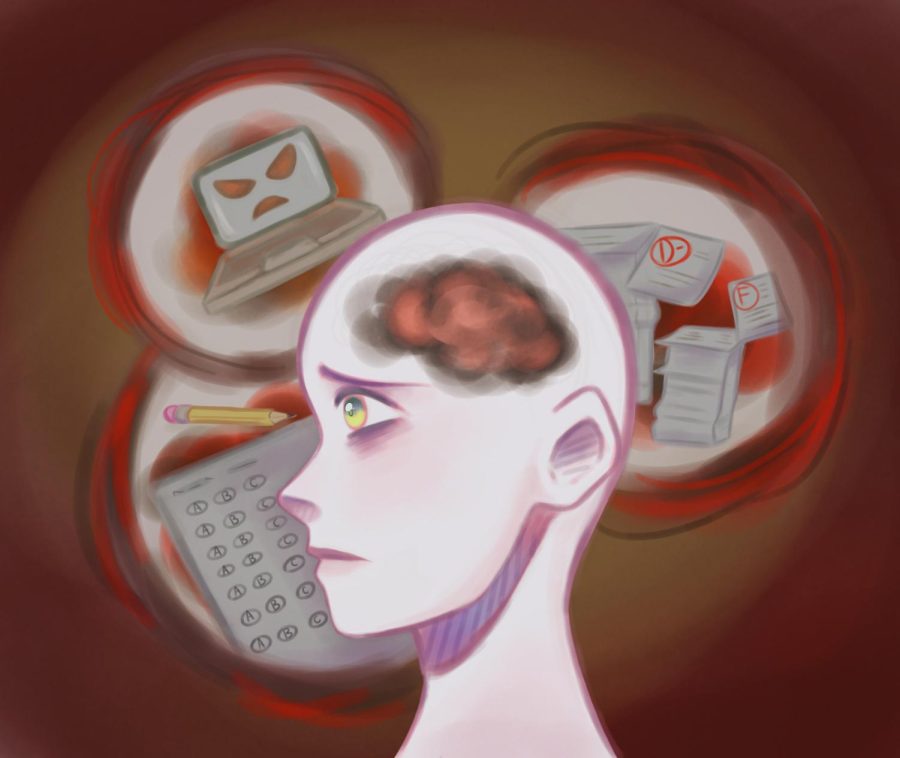Why Standardized Testing Should Be Optional
The unnecessary stress standardized tests give to students and teachers makes their negative effects outweigh the benefits. Those tests also aren’t good indicators of knowledge.
Stress building up as SOL’s are creeping around the corner.
May 25, 2023
With the SOL season recently completed, the yearly conversation of whether standardized tests are necessary has happened. Some argue that standardized testing, such as SOLs and MAP tests, offer useful data to help different groups of students. For example, students whose families are going through a financial hardship might have their scores compared to other students whose families don’t face that problem to see if the students with a difficult financial situation could be given better academic resources. Supporters of standardized testing also think it ensures that all students get an equal opportunity to show their learning and comprehension. However, standardized testing is an old school way to measure student achievement.
In 2012, a study by the Washington-based Brown Center on Education Policy was released. It showed that school’s all across America spent nearly a total of $1.7 billion per year just on standardized testing alone. Instead of paying that much for tests like the SOL, those funds could be used towards making better programs such as new electives and greater personalized learning opportunities that enhance creativity.
Unfortunately, creativity is shoved away when teachers are essentially restricted to the standards they’re told to teach because there wouldn’t be time to learn about other useful subjects. For example, in Pre-AP World History, there were many restrictions on how to write essays in order to meet the AP standards. As a result of that, the essay introductions were only able to show little to no personality. When there is an overwhelming number or learning requirements to meet, there won’t be much mind space left for exploring other topics that could be more relatable and interesting. Most of the time, the state’s standards are mostly based on memorization rather than truly understanding and applying a concept.
Lots of alternatives could be used instead of SOL’s. A study that consisted of 55,084 students in Chicago’s public schools showed that GPA scores were 5 times a stronger indicator for college success rather than the ACT test; it predicted graduation rates more accurately as well. Since a GPA is a grade point average, it takes all of the students work into consideration rather than just one big test. Therefore, it gives a more accurate representation of the student as a whole, and even lets them improve their GPA through hard work instead of having a number set in stone that makes or breaks them.
Standardized tests tend to negatively affect mental health as well. Anxiety and a lack of sleep increase before high stakes tests. Cortisol levels also rise which means that the stress hormone gets activated. A study done in 2018 determined that students between the ages of 7-15 had their cortisol levels increased by a minimum of a 15% average before they took their test. Others had their cortisol levels dropped significantly which meant that their mind shut down. The big tests triggered those fight, flight, or freeze reactions.
Since there’s a potential for greater negative effects than positive ones from these tests, other alternatives like a small end of the year quiz that’s a minor summative would be better.

























![The Phoenix varsity volleyball team lines up for the national anthem. “We were more communicative [with each other] during this game, and I feel like we kept our energy up, especially after the first set,” senior Jessica Valdov said.](https://theblazerrhs.com/wp-content/uploads/2024/10/DSC_0202-1200x800.jpg)










![Junior Alex Alkhal pitches the ball. “[I] just let it go and keep practicing so we can focus on our goal for the next game to get better as a team,” Alkhal said.](https://theblazerrhs.com/wp-content/uploads/2025/05/DSC_0013-1-1200x929.jpg)

























